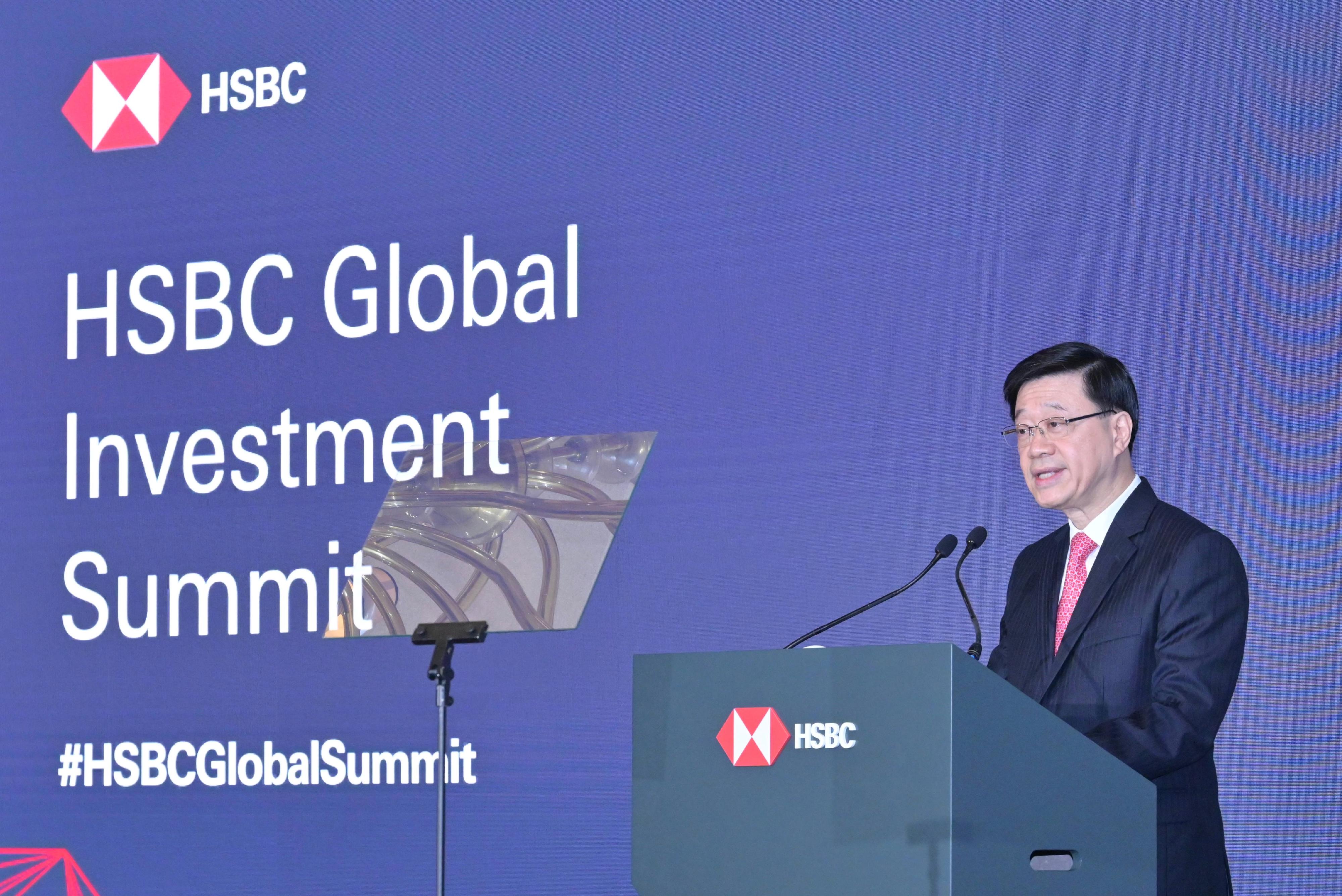
HONG KONG - Hong Kong Chief Executive John Lee Ka-chiu said on Monday the authorities were considering additional measures to bolster the securities market in the Asian financial hub.
Lee told the HSBC Global Investment Summit in Hong Kong that a host of measures had already been taken, including improving the listing regime for specialized technology companies, to enhance competitiveness.
"We are pleased that we're considering additional measures from improving the transaction mechanism to boosting investment services and stepping up market promotion," Lee said.
Lee noted that, at the end of 2023, the city’s stock market had a capitalization of almost $4 trillion, or more than 10 times Hong Kong's GDP
Battling high interest rates, geopolitical tensions, and a budget deficit, the Hong Kong SAR government in February announced a mix of measures to lure back capital, businesses, and visitors to the city.
Lee said these measures will help Hong Kong bounce back.
“While some have voiced their disappointment over what could well be short-term market volatility, others have expressed strong confidence in Hong Kong, and the abundant opportunities ahead of us – there for all of us,” Lee said.
"As the measures take hold, and the macro environment improves, so too will be the sustainable development of the stock market - of that I have no doubt," he said, adding the government was committed to enhancing market competitiveness.
Lee noted that, at the end of 2023, the city’s stock market had a capitalization of almost $4 trillion, or more than 10 times Hong Kong's GDP.
He said the territory’s long-term prospects remain bright and wide-ranging under the unique "one country, two systems" principle.
Lee said this ensures the continuous growth of Hong Kong's long-standing institutional strengths, including the rule of law and the world-renowned judiciary backed with independent judicial power; the free flow of capital, people and information; and a low and simple tax regime.
“Collectively, these longstanding advantages enable Hong Kong to play a unique role as a ‘super connector’ and ‘super value-adder’ between the mainland and the rest of the world,” Lee said.
He said that, under the nation’s National 14th Five-Year Plan, Hong Kong has been tasked with developing regional and global excellence in eight very distinctive areas, including finance and innovation and technology.
At the end of 2022, Hong Kong managed nearly $4 trillion in assets, two-thirds of which came from outside the financial hub. In 2023, the net inflow of funds domiciled in the city surged to over $11 billion, a year-on-year increase of 93 percent, Lee said
“We continue to increase mutual market access with the mainland. Northbound trading on Swap Connect was launched last year, becoming the world's first mutual-market-access scheme for derivatives,” Lee said.
He said the SAR government was also working to reinforce Hong Kong's status as the world's offshore renminbi hub, adding that about three quarters of all offshore renminbi payments are processed in the city.
“Well over 20 major stocks available in Hong Kong can now be traded in both Hong Kong dollars and renminbi, giving holders of offshore renminbi more investment choices,” Lee said.
He noted that Hong Kong is Asia's largest hedge fund center and second-largest private equity center.
At the end of 2022, Hong Kong managed nearly $4 trillion in assets, two-thirds of which came from outside the financial hub. In 2023, the net inflow of funds domiciled in the city surged to over $11 billion, a year-on-year increase of 93 percent, Lee said.
Hong Kong also has the largest population of ultra-high-net-worth individuals in the world and is now home to some 2,700 family offices.
“The multiplier effect that family offices can create for Hong Kong is tremendous. It is not simply about channeling big chunks of money to Hong Kong's capital markets,” Lee said.
“Family offices also stimulate demand for financial and other professional services, while creating more high-quality jobs. That, in turn, benefits the whole of Hong Kong's economy,” he added.
Lee said Hong Kong is also determined to attract strategic talent, with some 50 high-powered, high-tech companies choosing the city to either set up or to expand their business, bringing in more than $5 billion in investments, while creating some 13,000 jobs over the next few years
Lee also said that, in 2022, the total green and sustainable debt issued in Hong Kong, including bonds and loans, soared to $80.5 billion – up more than 40 percent over the previous year.
“We are determined to sustain our green bond issuances, extend our green-debt support to transition products, promote green fintech, and help companies and financial institutions in their sustainability reporting,” he said.
Lee said Hong Kong is also determined to attract strategic talent, with some 50 high-powered, high-tech companies choosing the city to either set up or to expand their business, bringing in more than $5 billion in investments, while creating some 13,000 jobs over the next few years.
“And that's just the beginning. Their presence here will help attract a wealth of related companies to Hong Kong, and that can only boost our fast-rising I&T sector,” he said.
Lee said the local startup sector increased last year to more than 4,200 firms – up 34 percent from just four years ago.
He said the SAR government will also boost its collaboration with other cities in the Guangdong-Hong Kong-Macao Greater Bay Area.
Last year, the Global Innovation Index published by the World Intellectual Property Organization ranked Shenzhen-Hong Kong-Guangzhou science and technology cluster second in the world, for the fourth year in a row, he added.
With Reuters inputs


